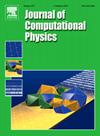平均场博弈的无监督解算子学习
IF 3.8
2区 物理与天体物理
Q2 COMPUTER SCIENCE, INTERDISCIPLINARY APPLICATIONS
引用次数: 0
摘要
深度学习的最新进展见证了许多创新框架,这些框架可以准确有效地解决高维平均场博弈(MFG)。然而,这些方法仅限于求解单实例MFG,并且每个实例需要大量的计算时间,限制了实用性。为了克服这个问题,我们开发了一个新的框架来学习MFG解算符。我们的模型将MFG实例作为输入,并通过一次前向传递输出它们的解决方案。为了确保所提出的参数化很好地适用于算子学习,我们引入并证明了我们的模型的采样一致性的概念,建立了它在采样极限下收敛于连续算子。我们的方法有两个主要优点。首先,它是无离散化的,使其特别适合学习高维mfg的算子。其次,它可以在不需要访问监督标签的情况下进行训练,大大减少了与现有算子学习方法中创建训练数据集相关的开销。我们在不同复杂性和维度的合成和现实数据集上测试了我们的框架,以证实其鲁棒性。与单实例神经MFG求解器相比,我们的方法在不影响计算解决方案质量的情况下,将解决MFG问题的时间减少了五个数量级以上。本文章由计算机程序翻译,如有差异,请以英文原文为准。
Unsupervised solution operator learning for mean-field games
Recent advances in deep learning has witnessed many innovative frameworks that solve high dimensional mean-field games (MFG) accurately and efficiently. These methods, however, are restricted to solving single-instance MFG and require extensive computational time per instance, limiting practicality. To overcome this, we develop a novel framework for learning the MFG solution operator. Our model takes MFG instances as input and outputs their solutions with one forward pass. To ensure that the proposed parametrization is well-suited for operator learning, we introduce and prove the notion of sampling consistency for our model, establishing its convergence to a continuous operator in the sampling limit. Our method has two key advantages. First, it is discretization-free, making it particularly suitable for learning operators of high-dimensional MFGs. Secondly, it can be trained without the need for access to superised labels, significantly reducing the overhead associated with creating training datasets in existing operator learning methods. We test our framework on synthetic and realistic datasets with varying complexity and dimensionality to substantiate its robustness. Compared to single-instance neural MFG solvers, our approach reduces the time to solve a MFG problem by more than five orders of magnitude without compromising the quality of computed solutions.
求助全文
通过发布文献求助,成功后即可免费获取论文全文。
去求助
来源期刊

Journal of Computational Physics
物理-计算机:跨学科应用
CiteScore
7.60
自引率
14.60%
发文量
763
审稿时长
5.8 months
期刊介绍:
Journal of Computational Physics thoroughly treats the computational aspects of physical problems, presenting techniques for the numerical solution of mathematical equations arising in all areas of physics. The journal seeks to emphasize methods that cross disciplinary boundaries.
The Journal of Computational Physics also publishes short notes of 4 pages or less (including figures, tables, and references but excluding title pages). Letters to the Editor commenting on articles already published in this Journal will also be considered. Neither notes nor letters should have an abstract.
 求助内容:
求助内容: 应助结果提醒方式:
应助结果提醒方式:


